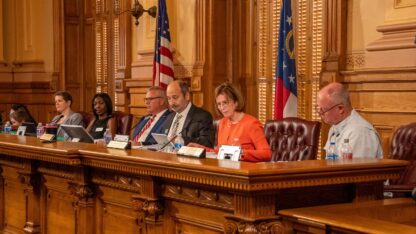Voices From the Atlanta Recovery Center

Joeff Davis / Creative Loafing
Vignettes of some of the men living at the Atlanta Recovery Center.
Dwain Smallwood
At age 55, Dwain Smallwood’s choice was The Recovery Center on Trinity Ave., or the downtown Atlanta sidewalk outside.
At the time, he didn’t think walking through those doors would save his life.
You have to lean in to hear Dwain’s scratchy whisper of a voice. The rewarded is slow, deliberate, and honest.
He admits cigarettes were his longtime best friends. But Dwian didn’t want to think that friendship was the cause of his chest pain.
The effects of stage three cancer on his body are evident, some two years later. Dwain says it’s been a “hectic” journey.
But he’s grateful to have family (that’s what he calls his fellow residents) to rely on.
“The facility gathered around me and helped me out a lot. Helped me get through it. I’m still here going strong.”
Derek Boyd
“Wow, this sure feels unsafe,” thought Derek Boyd when he first walked through the doors at 169 Trinity Ave. some twenty years ago.
But once inside, the Atlanta Recovery Center’s executive director says he met people “just like you and I.”
They just needed a little help, he says.
When the Great Recession hit, Boyd started to see a shift. Mothers showed up, children in tow. So did folks with degrees who, for the first time, found themselves jobless and homeless. And every night, people claimed all 165 of the facility’s beds; a few dozen others scribbled their names on a waiting list.
Many residents struggled to pay the $9 a night the facility charges to be self-sustaining. Eventually, Boyd says he had no choice but to cut staff.
Not even a shelter is immune to the economy. But it survived, and that’s something Boyd sees as no accident.
“Anywhere there’s God, there’s hope,” Boyd says of the non-denominational shelter. “What better way to instill that than in a place where folks need hope the most?”
Phillip Montgomery
Look into Phillip Montgomery’s eyes and you’ll understand.
Life, at least lately, hasn’t been easy. Phillip Montgomery says he can't work, and thus struggles sometimes to find the $9/day to pay for his bed.
“I just don’t get around like normal people, you know [who] can get up and go to work,” he says, citing a heart condition and “other” medical issues. “I can’t do it.”
When Phillip’s mother passed away a few years ago, paying the mortgage became impossible. The bank foreclosed. He found his way here.
Philip manages to find the $9 a day it costs to stay here, but admits even that’s tough most days.
He stares as he repeats what his eyes have said all along: “It is what it is.”
Check out the first in a series of reports from WABE in partnership with Creative Loafing entitled, “The Heavy Lift.” On newsstands this week, Creative Loafing’s Thomas Wheatley takes a look at how other area non-profits are picking up the pieces.
Next week, comparing and contrasting one of Atlanta’s largest non-profits with one of its smallest.
9(MDAxODM0MDY4MDEyMTY4NDA3MzI3YjkzMw004))





